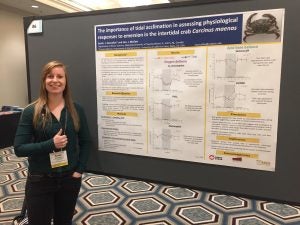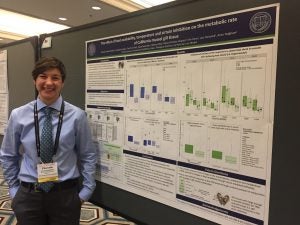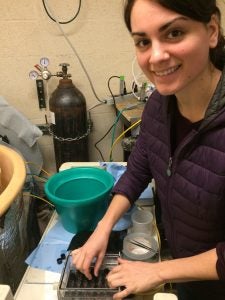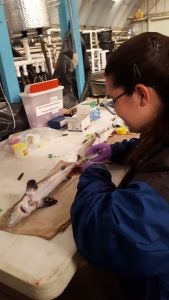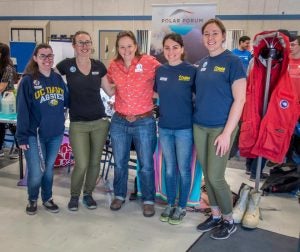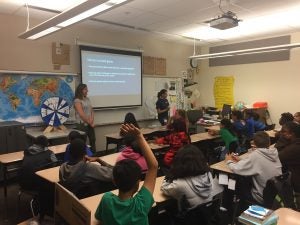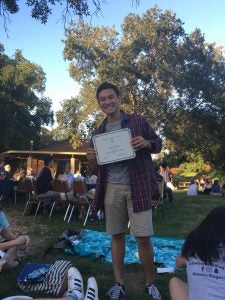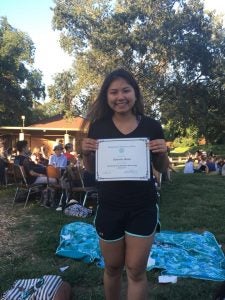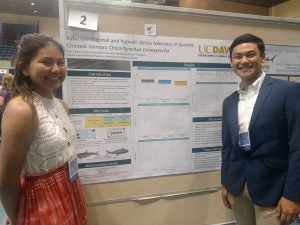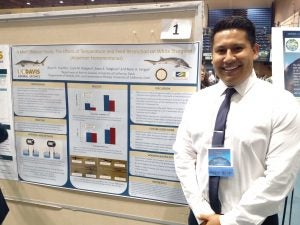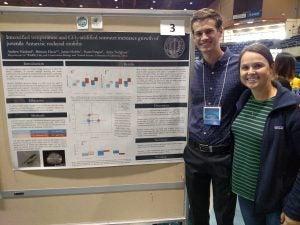Chessie and Sarah attended and presented posters at the 2018 American Physiological Society meeting in New Orleans, LA. Sarah (L) presented some of her recent master’s research about the physiological effects of tidal acclimation on the green crab. Chessie (R) presented data from an NSF funded collaborative research project on California mussels, sirtuins, and various stressors. Great job!
Page 3 of 4
Annelise Del Rio was recently awarded a Delta Science Fellowship from California Sea Grant and the US Bureau of Reclamation. Her PhD research will examine the effects of elevated temperature and hypoxia on the development and physiological performance of early life stages of Chinook salmon. Congratulations Annelise!
Read more about her and the rest of the 2018 Fellows at https://caseagrant.ucsd.edu/news/ten-early-career-scientists-named-2018-delta-science-fellows
Todgham lab members are off to Antarctica for another season of research at McMurdo station! Anne, along with students Mandy, Ken, and Andrew, will be studying the effects of warming and ocean acidification on Antarctic fishes. Check out their expedition blog (antarctica-ecofishiology.github.io) to see what they’re up to!

Michaiah’s first sturgeon project is now published in Comparative Biochemistry and Physiology Part A: Molecular & Integrative Physiology. Her work explores the differences in stress response, immunity and metabolism in white sturgeon of different ploidies acclimated to different temperatures. Read about it at Comparative Biochemistry and Physiology Part A: Molecular & Integrative Physiology or under our Publications page. Congratulations Michaiah!
Leal, M.J., Clark, B.E., Van Eenennaam, J., Schreier, A.D., and Todgham, A.E. 2018. The effects of warm temperature acclimation on constitutive stress, immunity, and metabolism in white sturgeon (Acipenser transmontanus) of different ploidies. Comparative Biochemistry and Physiology Part A: Molecular & Integrative Physiology
A collaborative project led by Todgham lab graduate student Brittany Davis is now available at Conservation Physiology. Her work investigated the effects of CO2-acidification and hypoxia on predator prey interactions as well as metabolism. She observed compensatory responses after an acclimation period that suggest these fish may be resilient to environmental changes predicted to occur with climate change. Read all about it at Conservation Physiology or under Publications!
Davis BE, Komoroske LM, Hansen MJ, Poletto JB, Perry EN, Miller NA, Ehlman SM, Wheeler SG, Sih A, Todgham AE, Fangue NA (2018)
Juvenile rockfish show resilience to CO2-acidification and hypoxia across multiple biological scales. Conserv Physiol 6(1): coy038; doi:10.1093/
conphys/coy038.
This spring several Todgham lab members participated in three outreach events to share our research with the public. At the annual UC Davis campus open house, Picnic Day, we had a station all about sturgeon. We had both tiny 1 month old sturgeon to view and larger 11 month old sturgeon in a touch tank so guests could experience sturgeon up close.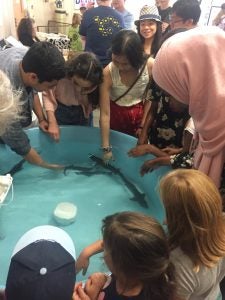
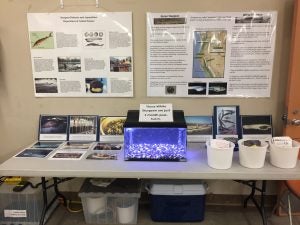
Lab members also visited two elementary schools. We had a station at Marguerite Montgomery Elementary School’s Science Expo here in Davis. Activities focused on the lab’s Antarctic research from current threats facing Antarctic fish and how we study physiology to the challenges of conducting research in Antarctica.
At Marion Mix Elementary in Elk Grove we visited a 6th grade classroom. We had a lot of fun teaching this enthusiastic class about salmon conservation, Antarctic fish physiology, and how we came to be graduate students.
Todgham lab undergraduate student Gabi Mukai was selected for the 2018 class of NOAA Hollings Scholars. Through the Ernest F. Hollings Scholarship she will receive financial aid as well as research experience at a NOAA facility. Congratulations Gabi!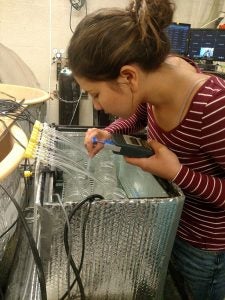
Three Todgham lab undergraduate students presented posters of their research at the 29th annual Undergraduate Research, Scholarship and Creative Activities Conference. Gabi Mukai and Lorenzo Olano presented their study of inducible stress tolerance in juvenile Chinook salmon. Bryan Puentes discussed a project studying the effects of temperature and feed restriction on white sturgeon. Andrew Naslund shared his work on the effects of ocean acidification on the growth of otoliths (ear bones) in juvenile Antarctic fish. They all worked very hard on their research projects this year and did a great job presenting!
 Graduate student Tinh Ton was awarded a competitive 2018 NSF Graduate Research Fellowship that will support his work studying KEYSTONEin in relation to mussel physiology and behavior. Congratulations Tinh!
Graduate student Tinh Ton was awarded a competitive 2018 NSF Graduate Research Fellowship that will support his work studying KEYSTONEin in relation to mussel physiology and behavior. Congratulations Tinh!
